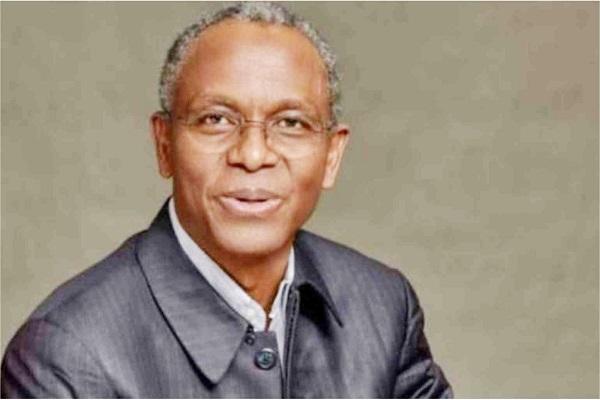It long last, and after a nerve-wracking rigmarole, the ruling party has finally done the needful. Its ruling caucus has technically zoned its presidential ticket to the south. Nigeria’s legendary ability to pull back from the brink of disaster appears to be at play once again. This was the path of honour and national duty to toe all along. But it appears that some hardliners in the party were bent on testing the water and the grit of their southern competitors.
Even then, it is not a done deal yet. It may well be a clever feint, a ruse and a bold opening gambit in a consuming and absorbing game of political chess. It is the politics of exhaustion, stupid. This is not a game for political neophytes and mandarin technocrats, unless they are fronting. It may well be a tactical manoeuvre to throw the ball back at the southern stalwarts in a technical ploy known among the wily Yoruba as letting the monkey kill itself.
Whatever it is, you must give it to Nasir el-Rufai, the fiery and feisty governor of Kaduna State. This column has not always been a fan of el-Rufai’s politics and occasionally intemperate outbursts. But in this one, he came across as an honest, scrupulous, and fair-minded broker.
In announcing the decision on behalf of his colleagues, the governor made the valid point that in an assemblage of people with different personalities, worldviews and clashing ambitions, there is bound to be differences of opinion. What is important is to harmonize these views in the greater party and national interest taking cognizance of the political reality on the ground and the prevalent mood of the nation.
Whether President Mohammadu Buhari goes ahead and do the needful by assenting to the bill on his table is now beside the point and utterly irrelevant. A consensus has emerged that under his watch, Nigeria is likely to fumble and wobble its way to an electoral denouement or an outright democratic debacle, if our legendary political luck does not hold.
Before the APC ruling caucus decided to announce its zoning formula to the world, several untoward developments had cast a tragic pall over the nation. A few of them can be taken in no particular order. First was the decision to postpone the APC party congress for the umpteenth time. It does not show the workings of an organic political party bound together by the same ideological strand.
On the contrary, it shows a besieged phalanx of desperate office seekers unable to organize and close to terminal implosion. The original strength of the party is also its subsequent weakness. It was a chaotic ensemble of disparate and ideologically incompatible elements united by a single minded resolve to unseat the ruling PDP which had become an albatross weighing heavily on the neck of the nation.
The new coalition succeeded brilliantly in its quest, probably beyond the imagination of its moving spirits. But as we are all discovering to our tragic peril, regicide is one thing, building a new order out of the debilitating debris of the old order and away from the chaos of hegemonic party collapse is another matter entirely. In fact, regicide is an easier task.

The victory party was barely over when the apocalyptic fissures began to stare everybody in the face. In a sense, APC is a victim of its own instant success. The party never had the chance to organize its sinews and to congeal and coalesce around a set of defining parameters and precepts. Rather than embark on this quest for distinct identity, the party began a wholesale mopping up of renegade elements from the PDP as its operative procedure, as if it is the humongous size that matters.
A deluded chieftain of the party was known to have famously proclaimed that all sins are forgiven and forgotten once you join the APC. Photo-ops were arranged with elements whose names carry the badge of opprobrium and obloquy. With that, efforts to sanitize the polity became dead on arrival while the half-hearted attempts to curb corruption became a sick joke.
The de-civilizing effects of the politics of the Fourth Republic and the utter collapse of the moral and spiritual anchor of the nation are here for everybody to see. The nation is in the grip of an institutional meltdown. The police force has been taken to the cleaners.
When a hitherto wildly venerated super cop turns out to be an armed robbery kingpin, the national shock and trauma can be better imagined. But when it is now discovered that the same cop, ostensibly under suspension, has been operating and flourishing as a major drug baron and kidnap kingpin, we wonder who will lift the current pall of darkness over the nation.
That so far no resignation has been offered from the top police echelon and none has been demanded shows an administration completely overwhelmed by the millennial rot. This present darkness is all-pervading and all-consuming. Before our very eyes, the nation is steadily regressing into the Stone Age.
The discovery of locomotive cannibals preying on rail infrastructure and dismantling newly laid tracks for base profit motive shows a society on its last gap to modern barbarism. The stomach infrastructure that we have not taken care of will take care of the modern infrastructure we delude ourselves to be laying.
A superstructure cannot survive on a false structure. General Buhari spoke too soon and superficially when he was said to have observed that but for the new rail line, people would have been trekking from Lagos to Ibadan. It is only a question of time before that fate overtakes the nation. By then, the general would have reunited with his cows in Daura in all its pristine serendipity.
It is now important for the general from Daura to understand and appreciate that there is only so much a man can do given his limitations. No leader can overcome the debilitating constraints of personality and specific insertion into the historic process. The former infantry general has given his best. As the lame-duck hour dawns, what the general should do is to develop an acute sense of an ending and begin to plan for a honourable exit from power.
As we have noted once on this page and at a public forum, the general needs to constitute a committee of his trusted friends, aides and well- wishers. The first thing the committee should do is to take a frank audit of his failings in power and to undertake a serious evaluation of the failure of the Nigerian political class and its inability to modernize the country politically or economically.
With the door of restructuring firmly shut in the face of its proponents, and with barely a year remaining before the descent of the twilight zone of inter-presidency, the general should refrain from any costly political gambit that could torpedo the whole nation. He has wisely pushed the subsidy Armageddon to his successors. If we manage to avoid a Venezuelan slide into fiscal chaos or Zimbabwean currency meltdown, the country has enough resources for a swift recovery, provided the current circumstances can throw up the right leadership.
Perhaps we should take a cue from our former colonial masters. The Brits are past masters of this genre, with their sense of an ending honed to perfection. From the time of William Shakespeare, British public figures have learnt how to deal with the fickle and unpredictable masses. It has always been a tense cohabitation with aristocratic disdain and wariness a perfect foil for popular terror and the ill-will of the hoi polloi. Every politician prepares for the day when mere anarchy will be loosed upon the world.
When Winston Churchill was asked why he was only responding in a rather tame and tepid manner to the wild cheering and swooning adulation of the people at a victory parade, the great British statesman responded that if he was being marched to the execution stakes, the same masses would be on hand to mock and denounce him. Shortly after leading his people to their greatest victory ever, Churchill was ousted from power.
The sense of an ending requires a combination of tact, decency, honour, good humour, and immense self-esteem. Such is the importance attached to this unwritten code of conduct in British politics and letters that Frank Kermode, a great literary critic of the last epoch, penned a classic collection of essays with the main title, The Sense of An Ending.
Kermode had risen to literary stardom from a provincial and very unpromising background, having trained in a red brick university. But despite the subsequent critical acclaim, celebrity and a prestigious chair, the shy, diffident and urbane gentleman never forgot who he was or where he was coming from.
In the no-nonsense cloak and dagger world of British politics, it often amounts to a fatal error of judgement for a politician not to read correctly where the wind of change is blowing. It is not an unusual sight to see a dethroned prime minister hurriedly evacuating No10 Downing Street through the backdoor as the triumphant victor swept through the front door.
It was a very tearful and forlorn Margaret Thatcher that headed for Buckingham Palace to tender her resignation after being ousted by her own backbenchers in a typically British political assassination. Among the galaxy of political gladiators, the dour and ordinary-looking John Major was the least fancied to succeed her. Yet he trounced better-credentialed opponents.
Five years later and hours after the selfsame John Major was worsted by Tony Blair, he was sighted at the Oval Cricket grounds drinking warm beer and munching fish and chips. But after winning three straight elections in a row Tony Blair himself was almost physically bundled out of Downing Street by his longsuffering successor who could no longer put up with his shiftiness and reluctance to honour a gentleman’s agreement about power-sharing. Gordon Brown, a fearsome Scot with a permanent scowl, was already prowling with intent.
A sense of an ending requires a sense of history. From the evolution of human societies, it is strong institutions as handed down by strong people that always make the difference between order and chaos. Even angels cannot thrive or survive in a state of nature.
Institutions are there to restrain corrupt and perverted individuals however strong or powerful. While Donald Trump was huffing and puffing about not leaving the White House, all he needed was a look around him to conclude that he would be bundled out like a common trespasser at the appointed hour.
In the ethical chaos and institutional collapse of postcolonial Africa, rare is the leader with the sense of an ending buoyed by a deep immersion in history. The bulk of Nigeria’s post-independence leadership has been particularly remiss in this wise. They have demonstrated an appalling lack of judgement and a chronic inability to rule according to constitutional requirements even in a civilian setting.
After famously reneging on his promise to return the country to civilian rule, the otherwise affable and urbane General Yakubu Gowon began to stall and stonewall until he was flushed out by his outraged colleagues. In his first coming, General Buhari could not even be bothered about any democratic programme. Having been thwarted in his bid for an unconstitutional third term, Obasanjo spent his remaining days in office embroiled in a fearsome power struggle with his estranged deputy which beclouded and sullied everything else.
Sixteen years after and twenty-three years into the post-military civil rule, Nigeria is transiting to a fresh civilian regime amidst the context of widespread institutional anarchy and gross party mismanagement. Such is the fear and trembling combined with ethnic loathing and fearsome mutual distrust that not even the leading presidential candidates can show their full hand for fear of executive reprisal and official disincentives.
The sense of an ending is abroad and the apocalypse is on the horizon. We must summon the original spirit of our old founding fathers and their noble mantra of give and take. As we approach the last bend in a turbulent river, here is wishing the navigators the very best of luck and good fortune.




















